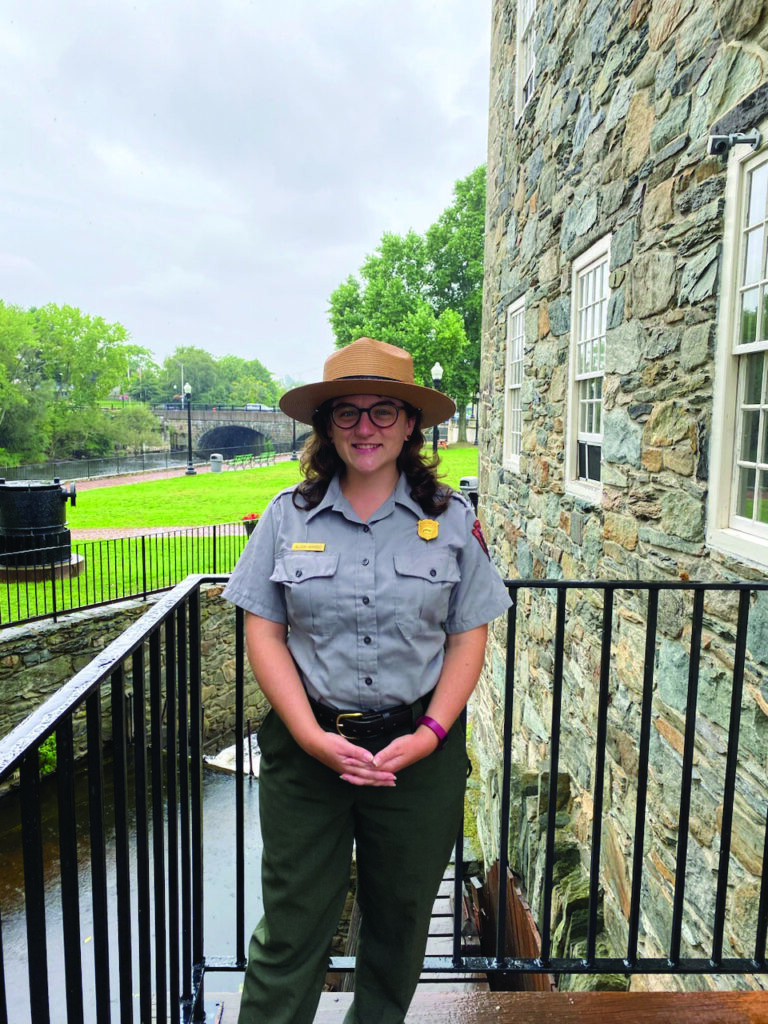Allison Horrocks ’09
 DEGREE:
DEGREE:
B.A. in American studies; Ph.D. in history, University of Connecticut
JOB TITLE:
Park ranger, National Park Service
FAVORITE TRINITY MEMORY:
I was part of the first group of students to live in The Fred Pfeil Community Project. It felt special to be part of something new on campus.
What does your park ranger work entail?
I currently work as a park ranger at Blackstone River Valley National Historical Park in Pawtucket, Rhode Island. I am based out of Old Slater Mill National Historic Landmark. This bistate park includes six separate historic sites in Rhode Island and Massachusetts. Working for the National Park Service has enabled me to further my passion for historical research. Since taking a job with the agency in 2016, I have had the opportunity to collaborate on exhibits, public tours, virtual programs, app-based content, and lots of community initiatives.
And what about your podcast?
I am a co-host of the Dolls of Our Lives podcast (formerly the American Girls Podcast) with Mary Mahoney ’09. The show launched four years ago in 2019. For each episode, Mary and I revisit some facet of the American Girl brand, with a special focus on the historical books and characters. This show allows us to combine an interest in American Girl with our backgrounds in history and unofficial credentials in studying popular culture. Both of us grew up loving American Girl. It’s been a real privilege to connect with fellow fans as well as critics over the past few years. Being part of this podcast has also opened the door for me to be a guest on other shows and to do some audio work for my job.
What do you enjoy most about each of your roles?
For a brief period of time, I was teaching in a classroom. That kind of work did not really suit me in the phase of life I was in. Being an interpreter and working on a podcast have enabled me to think more broadly about the uses of education. I love being able to talk about history with people who are choosing to learn with me. The podcast in particular has allowed me to connect with so many people I will never have the pleasure of meeting. That continues to be a really fun aspect of doing the work. As a park ranger, I appreciate being part of a large agency and working at a landmark that attracts visitors from all over the world. I recently gave a tour to a person who’d been wanting to visit the mill I work in for over 55 years. It’s a remarkable thing to be even a small part of that person’s life.
What are the biggest challenges you face in each position?
I never expected that I would be a podcaster or a park ranger. I was premed when I started at Trinity. What I like the most about both of these jobs is the fact that I am always learning and there are always new ways to grow. One of the biggest challenges for public historians is the speed with which news cycles and conversations on the web are moving. It can be hard to produce thoughtful content in this climate where internet trends seem to be accelerating at an almost impossible rate.
How did Trinity prepare you for what you do now?
I took a lot of history and American studies classes at Trinity. In most of my courses, professors had an interdisciplinary approach. That has served me well in my career as a public servant, where extreme specialization is not really possible or always useful. When I visited Trinity as a high school student, I sat in on a seminar about Sylvia Plath. I was sort of in awe that this type of thing existed. Looking back, something in my worldview shifted just by sitting in that room. Today, having a podcast and making public history content allow me to sit with interesting topics and wide-ranging audiences all the time.
What was the most memorable course you took at Trinity?
One of the most important classes was about the United States and Vietnam. This course was taught by Professor Lestz and Professor Chatfield. I liked that the course was collaborative and challenging. It was also one of my more in-depth introductions to recent history.
Was there a professor at Trinity who was particularly influential?
I took several classes with Professor Jonathan Elukin, including the historiography course required of majors. A book he assigned on footnotes helped me better understand what I wanted to do with my life. He also had a practice of bringing in books that informed each of his lectures. It was such a simple thing, but it allowed me to understand that he wasn’t a magician. He had learned how to become a good lecturer and historian. Showing how he built that knowledge was really transformative for me and an excellent example of how to be a role model.
To tune into the next episode of Dolls of Our Lives, please visit https://dollsofourlivespod.com/.
